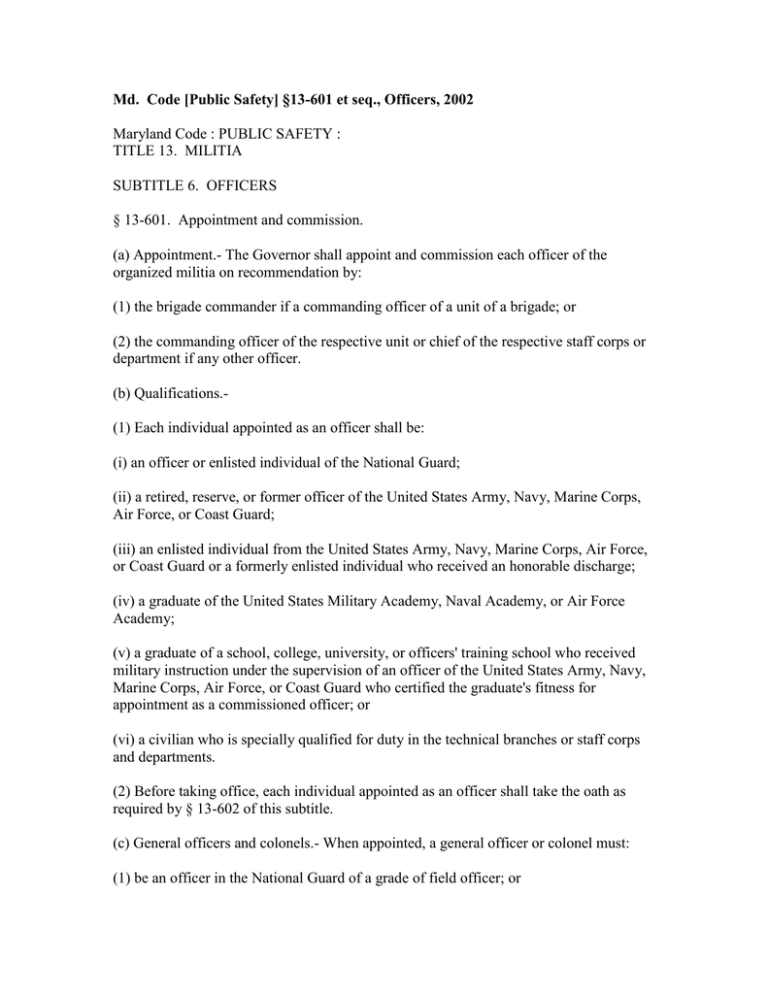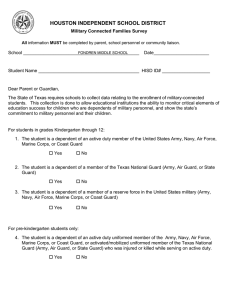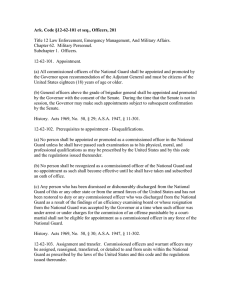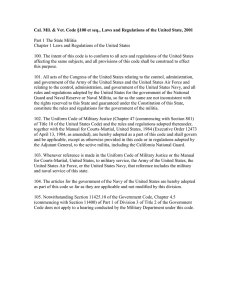Md. Code Public Safety §13-601 et seq.doc
advertisement

Md. Code [Public Safety] §13-601 et seq., Officers, 2002 Maryland Code : PUBLIC SAFETY : TITLE 13. MILITIA SUBTITLE 6. OFFICERS § 13-601. Appointment and commission. (a) Appointment.- The Governor shall appoint and commission each officer of the organized militia on recommendation by: (1) the brigade commander if a commanding officer of a unit of a brigade; or (2) the commanding officer of the respective unit or chief of the respective staff corps or department if any other officer. (b) Qualifications.(1) Each individual appointed as an officer shall be: (i) an officer or enlisted individual of the National Guard; (ii) a retired, reserve, or former officer of the United States Army, Navy, Marine Corps, Air Force, or Coast Guard; (iii) an enlisted individual from the United States Army, Navy, Marine Corps, Air Force, or Coast Guard or a formerly enlisted individual who received an honorable discharge; (iv) a graduate of the United States Military Academy, Naval Academy, or Air Force Academy; (v) a graduate of a school, college, university, or officers' training school who received military instruction under the supervision of an officer of the United States Army, Navy, Marine Corps, Air Force, or Coast Guard who certified the graduate's fitness for appointment as a commissioned officer; or (vi) a civilian who is specially qualified for duty in the technical branches or staff corps and departments. (2) Before taking office, each individual appointed as an officer shall take the oath as required by § 13-602 of this subtitle. (c) General officers and colonels.- When appointed, a general officer or colonel must: (1) be an officer in the National Guard of a grade of field officer; or (2) have been in active service in the United States Army, Navy, Marine Corps, Air Force, or Coast Guard or National Guard with a grade higher than captain. (d) Lieutenant-colonels and majors.- When appointed, a lieutenant-colonel or major of the line must have had active service as an officer for at least 2 years in the United States Army, Navy, Marine Corps, Air Force, or Coast Guard or National Guard. [An. Code 1957, art. 65, § 20; 2003, ch. 5, § 2.] § 13-602. Oath. A commissioned officer of the organized militia shall take the following oath of office: "I,..............., do solemnly swear that I will support and defend the Constitution of the United States and the Constitution of the State of Maryland, against all enemies, foreign and domestic; that I will bear true faith and allegiance to the same; that I will obey the orders of the President of the United States and of the Governor of the State of Maryland; that I make this obligation freely, without any mental reservation or purpose of evasion, and that I will well and faithfully discharge the duties of the office of................... in the National Guard of the United States and of the State of Maryland upon which I am about to enter, so help me God." [An. Code 1957, art. 65, § 19; 2003, ch. 5, § 2.] § 13-603. Examination. (a) Subject of examination.- Each individual appointed as an officer shall pass the tests that the Governor requires on physical, moral, and professional fitness. (b) Method of examination.- The Governor shall appoint a board of three commissioned officers from the United States Army or Air Force or the National Guard to conduct the examination required by subsection (a) of this section. [An. Code 1957, art. 65, § 21; 2003, ch. 5, § 2.] § 13-604. Date of taking rank. An officer shall take rank from the date that the officer was commissioned and in the manner the United States Department of Defense provides by regulation. [An. Code 1957, art. 65, § 21; 2003, ch. 5, § 2.] § 13-605. Brevet commissions. (a) Governor to confer grade.- (1) On the recommendation of the Adjutant General, the Governor may grant to an officer of the organized militia a brevet commission of the next higher grade than the regular commission held by the officer. (2) The Governor may grant a brevet commission to an officer of the organized militia of a grade equal to the highest grade in which the officer previously served in the organized militia or in the United States Army, Navy, Marine Corps, Air Force, or Coast Guard. (b) Rights and privileges.- A brevet commission carries only the rights or privileges that are allowed in like cases in the military service of the United States. [An. Code 1957, art. 65, § 36; 2003, ch. 5, § 2.] § 13-606. Removal from office. (a) In general.- Except as otherwise provided in this title or by regulations of the United States Department of Defense, a commissioned officer may not be removed from office unless the officer consents to the removal. (b) Action by efficiency board.- A commissioned officer shall be discharged if: (1) an efficiency board of three commissioned officers, senior in rank to the officer whose fitness for service is under investigation, appointed to determine the moral character, capacity, or general fitness for service of the commissioned officer makes an unfavorable finding; and (2) the official authorized to appoint the efficiency board approves of the findings of the efficiency board. [An. Code 1957, art. 65, § 22; 2003, ch. 5, § 2.] § 13-607. Vacating commission. A commission of an officer may be vacated: (1) on resignation; (2) through absence without leave for 3 months; (3) on recommendation of an efficiency board; or (4) under a sentence of a court-martial. [An. Code 1957, art. 65, § 22; 2003, ch. 5, § 2.] § 13-608. Resignation of officer. (a) Honorable discharge.- A commissioned officer tendering a resignation shall receive an honorable discharge if: (1) the Governor accepts the resignation; (2) the officer is not under arrest or returned to a military court for a deficiency or delinquency; (3) the officer is not indebted to the State; and (4) the accounts of the officer for money or public property are correct. (b) Other - Discharges.(1) If the Governor accepts the resignation of an officer who, at the time of the resignation, is under arrest, under charges, or returned to a military court for an offense, deficiency, or delinquency, the officer shall: (i) cease to be an officer; and (ii) receive a discharge in a form that the Governor directs. (2) An officer who resigns under paragraph (1) of this subsection is not eligible to receive a commission unless the officer: (i) reenlists; and (ii) performs at least 100% of duty in each year of the reenlistment for 2 successive years. [An. Code 1957, art. 65, § 23; 2003, ch. 5, § 2.]





